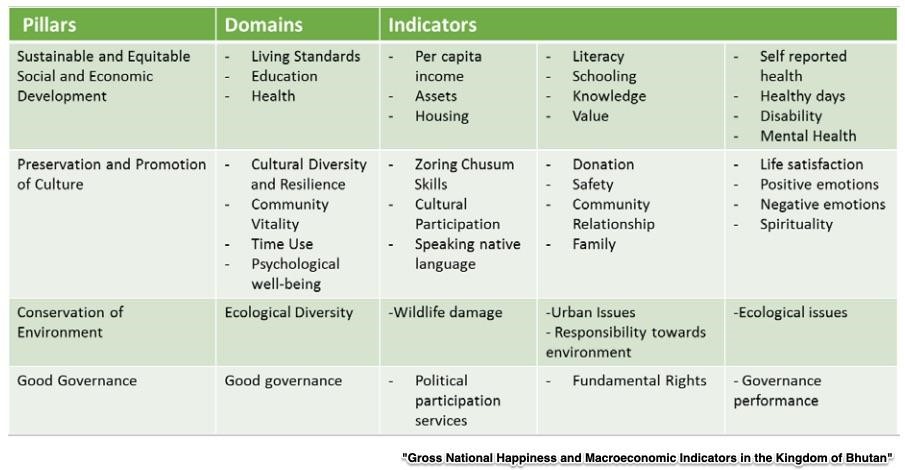Gross National Happiness – Substitute or Supplement?
By Saujanya Rauniyar
A single metric to gauge a nation’s progress and prosperity is an idea that has always had a good backing. Gross Domestic Product (GDP), proposed to measure the same, is widely accepted as the world’s most powerful statistical indicator of national development and progress.
But a metric solely measuring the economic output of a country, being used to indicate something as important as a nation’s progress, paves the way for arguments and limitations as to how skewed the concept can be.
Ever since the development of GDP, multiple observers and scholars have pointed out limitations of using GDP as the overarching measure of progress.
Forty years ago, Robert F. Kennedy, a US Politician and Lawyer, delivered a speech challenging GDP as a measure of progress and growth for a nation. In his speech he stated, “Gross Domestic Product does not allow for the health of our children, the quality of their education, or the joy of their play. It does not include the beauty of our poetry or the strength of our marriages, the intelligence of our public debate or the integrity of our public officials. It measures neither our wit nor our courage, neither our wisdom nor our learning, neither our compassion nor our devotion to our country; it measures everything, in short, except that which makes life worthwhile.”
In view of the given concerns and lack of inclusion of the factors thereof, a concept was incepted by Bhutan in the early 1970s – Gross National Happiness.
The Concept
Gross National Happiness (GNH) is an index used by Bhutan to measure the collective happiness and well-being of a population. The concept considers happiness to be a more holistic approach to development, in contrast with the isolated income/output factor considered in the GDP. The index is divided into 9 domains, backed by the ideology of the four pillars of GNH:
1) Sustainable and equitable socio-economic development;
2) Environmental Conservation;
3) Preservation and promotion of culture; and
4) Good governance
The nine domains of GNH – psychological well-being, health, time use, education, cultural diversity and resilience, good governance, community vitality, ecological diversity and resilience, and living standards – are the factors that are measured while calculating the GNH index. The measurement is done in the form of primary surveys through questionnaires, providing equal representation to all the regions of the country.
The GNH Index is a single number ranging from zero to one, with zero being the lowest possible value and one, the highest possible value.
How they Compare

Both concepts have different ideologies in their measure of progress and development. While GDP only focuses on the monetary aspect, GNH considers income only as a small part in its calculation criteria, amongst other factors. For instance, consider that there are two people; one whose life is consumed by working, leaving barely any time for friends and family, and another, who does not work much but has plenty of time for friends and family. Now, according to Carol Graham (a Senior Fellow at the Brookings Institution), the person who spends time with family and friends ends up having a larger GNH, than the person who is just in it for work.
When researchers from the International Monetary Fund (IMF) tried to determine whether increases in the GNH and the GDP were related, they concluded, “…available evidence indicates that Bhutan’s rapid increase in national income is only weakly associated with increases in measured levels of well-being.” So, although both rose (shown below), causation would require additional up to date numbers.
A likely alternative?

GNH covers up an array of indicators that the GDP is criticized for overlooking. It takes into consideration social factors like health and education, in addition to economic indicators like income. It also accommodates environmental conservation, cultural preservation and satisfaction with the governance while calculating the index. The inclusion of these factors help in a more holistic determination of the well being of a country.
However, it fails to give complete relevance when the economic or monetary aspect is of a higher importance. In cases where the economic situation or income level is of greater relevance, such as when the government is considering tax reforms, GNH doesn’t help in providing the perfect picture needed to frame the policy. This is because GNH considers income only as a small part under its calculation factors. These are areas where GDP comes handy by providing a better picture and understanding needed for such policy changes.
Both the indicators complement each other at various instances, providing better insights when taken together. GNH as a policy measure as well as a screening tool helps give a comprehensive insight into the situation; while at the same time, GDP helps in extensively analysing the economic context of the same. Both, as a result, should be considered in tandem while taking any policy and governmental decision and preparing future developmental plans.
